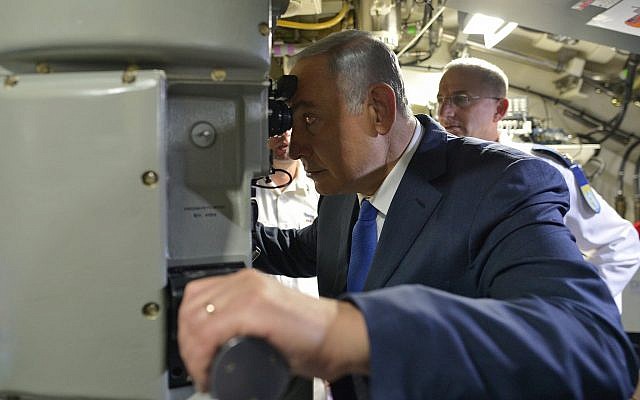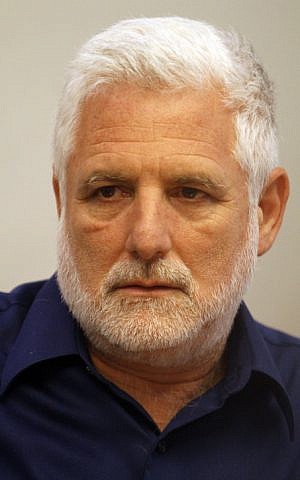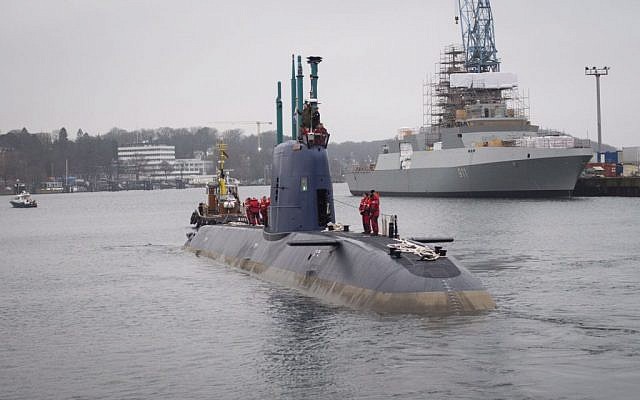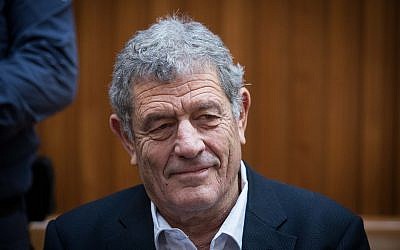In leaked affidavit attached to petition demanding probe of PM’s role in huge submarine scandal, Dan Harel says Netanyahu heavily pressured him to buy vessel without explaining why

Leaked testimony provided by the former director-general of the Defense Ministry possibly ties Prime Minister Benjamin Netanyahu to a major graft scandal known as the submarine affair that has ensnared several of his associates, but so far not himself.
The affidavit by Dan Harel, reported by Channel 12 news Monday evening, related to so-called Case 3000, in which prosecutors allege Israeli officials were bribed to advocate for a multi-billion-shekel procurement of military boats and submarines from German shipbuilder Thyssenkrupp in 2016.
The scandal also involves the sale of two Dolphin-class submarines and two anti-submarine warships by Germany to Egypt, allegedly approved by Netanyahu without consulting or notifying the Defense Ministry. While Germany does not require Israeli approval to sell the advanced submarines to other countries, it has shown Jerusalem that courtesy in order to maintain Israel’s qualitative edge in the region.
A police investigation in the case, in which the premier himself was not a suspect, ended in February 2020. Critics and rivals of Netanyahu allege he had a possible conflict of interest surrounding the massive deal for the vessels, worth hundreds of millions of dollars.
Harel’s leaked testimony was said to be included in a High Court petition filed recently by the Movement for Quality Government in Israel demanding that a criminal investigation be opened against Netanyahu in the case. The statute of limitations in the case expires next month, after which courts will no longer have the jurisdiction to deal with it if an investigation is not opened.
Harel, an associate of then-defense minister and current Netanyahu rival Moshe Ya’alon, reportedly said a document written at the time by the National Security Council — which is part of the Prime Minister’s Office — had been presented to him, saying that Netanyahu was ordering him to cancel a tender for firms interested in providing the vessels and hold it in Germany or in a way that otherwise favors Thyssenkrupp.

“I made it clear that without a written instruction directly from the prime minister and with his signature I had no intention of canceling the tender, and even then, I would ask to meet him and understand why. That demand didn’t receive any response,” Harel said in the affidavit.
Harel testified that Netanyahu’s personal lawyer and second cousin David Shimron had also been seeking to stop the tender at the premier’s behest. Shimron was suspected of mediating a bribery deal in the submarine case, but that charge was dropped by police and he is instead charged with money laundering.
“I didn’t imagine at the time that Shimron was also connected to Thyssenkrupp’s representative in Israel,” he said, referring to Miki Ganor, who is being charged with bribery, money laundering, and tax offenses in the case.
“Netanyahu told me and Mr. Ya’alon very resolutely that he wants another, seventh submarine to be purchased, while banging with his fist on the table,” he added. “My impression was that behind this purchase initiative was an interest that was unclear to me, to broaden the connection with Thyssenkrup and increase the value for the company in an unjustified way. That impression became stronger due to the article referring to the purchase of two anti-submarine vessels.”
The Movement for Quality Government, in response to the report, demanded that Attorney General Avichai Mandelblit probe who leaked the document, adding that it had not been handed to any journalist and had been delivered to the court in a sealed folder.
“An investigation should be immediately opened to see who is trying to disrupt and sabotage an investigation meant to expose the biggest corruption scandal in Israeli history,” said Movement for Quality Government chairman Eliad Shraga.

A statement from Netanyahu’s office claimed the news was “recycled,” since Harel had previously been questioned and “his testimony was found to have no substance.”
The statement argued that the Movement for Quality Government, “who are identified with the extreme left,” deliberately collected testimonies from Ya’alon and Harel rather than other defense officials such as former national security advisers Yaakov Nagel and Yaakov Amidror who supported the purchase.
In August, the Yedioth Ahronoth newspaper reported that a number of former senior top IDF officers and Defense Ministry officials had recently submitted affidavits to the High Court of Justice demanding a reexamination of the prime minister’s role in the submarine affair.

According to the report, 15 statements were made by former senior brass — presumably including Harel — as part of the lawsuit filed in June by the Movement for Quality Government, which called for a renewed investigation into Netanyahu’s role in the affair, as well as a possible commission of inquiry. The latter demand has been rejected.
Apart from Ganor, Eliezer Marom, a former head of the Israeli Navy, is also being charged with bribery, money laundering and tax offenses in the submarine case. Avriel Bar-Yosef, Netanyahu’s onetime pick for national security adviser, faces charges of requesting a bribe, taking a bribe, fraud and breach of trust.
According to state prosecutors, Bar-Yosef approached Ganor about becoming Thyssenkrupp’s representative in Israel because he “wanted to derive financial benefit.” He then allegedly enlisted Marom, who was head of the navy at the time, to help lobby for Ganor’s appointment.
Ganor allegedly went on to pay them NIS 200,000 ($58,000) in total, with prosecutors accusing Bar-Yosef of working to advance naval purchases while serving as deputy national security adviser.
Also facing charges of bribery, breach of trust and money laundering in the case is David Sharan, a former aide to Netanyahu and to Energy Minister Yuval Steinitz.
The prime minister is currently on trial for fraud and breach of trust in three unrelated criminal cases and bribery in one of them. He denies the charges against him and claims he is the victim of an attempted political coup orchestrated by the police, prosecutors, opposition and hostile media.
